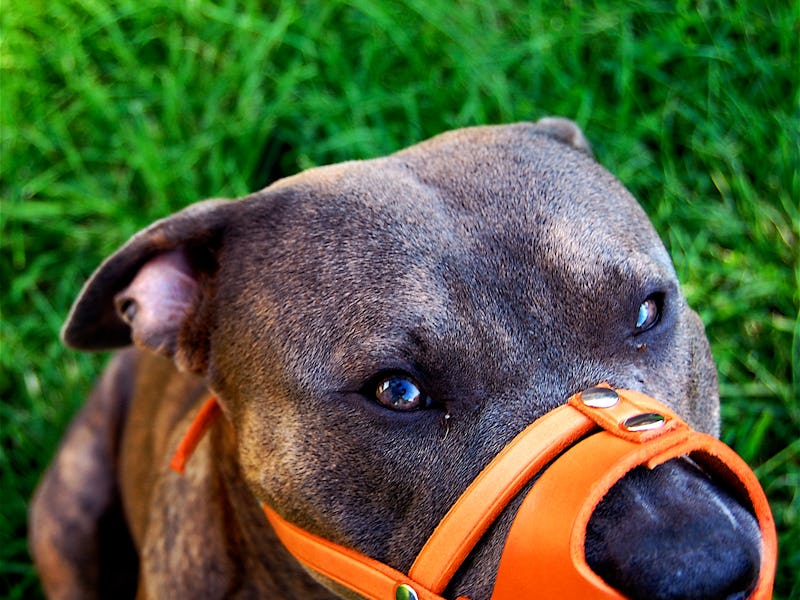The Dystopian Future Has Arrived for British Dogs
Microchips, surveillance, and genetic profiling are the new normal for the UK's best friends.

Imagine a future in which everyone is identified by a microchip implant under their skin, certain phenotypical traits have been outlawed, and the government is always watching. No, this isn’t an elevator pitch for a gritty 1984 reboot, it’s 2015 — if you’re a dog in the United Kingdom.
By April 2016, every dog in Britain will be fitted with a microchip by the age of eight weeks, on penalty of potential criminal prosecution for owners that fail to comply. And good luck evading the peering eyes of Big Brother, in a country where there’s one surveillance camera for every 11 residents.
But that’s kid stuff compared to the UK’s ban on certain dog breeds, which amounts to a program of eugenics. It’s illegal just to be a pit bull terrier, a Japanese Tosa, a Dogo Argentino, or a Fila Brasileiro, which are breeds that have been bred for fighting abilities and sometimes trained for aggression. There’s no genetic test for which dog is illegal and which is legal —- the line is much murkier. A pit bull, for example, is not so much a breed as a conglomeration of physical and behavioral traits considered to be pit bull-ish, a point that the UK government freely acknowledges. “Whether your dog is a banned type depends on what it looks like, rather than its breed or name,” according to the government literature.
This Japanese Tosa weighs in at 140 pounds, and is expected to gain another 40.
And if your dog is fingered by a nervous neighbor, good luck with innocent-until-proven-guilty: “It’s your responsibility to prove your dog is not a banned type. If you prove this, the court will order the dog to be returned to you. If you can’t prove it (or you plead guilty), you’ll be convicted of a crime. You can get an unlimited fine or be sent to prison for up to 6 months (or both) for having a banned dog against the law. Your dog will also be destroyed.”
Police can take your dog even if your dog has shown no aggressive behavior and even if there has been no complaint. They can take your dog without a warrant if your dog is in a public place.
The only hope for your dog, if the powers-that-be determine it to be illegal, is the justice system, but the burden of proof is on the owner — and the animal to a certain degree — to prove a complete lack of malice. And you know what they say about proving a negative. Still, if you manage to do this, your dog’s name goes into the, no joke, Index of Exempted Dogs, a registry of dogs of banned-types. Dogs on the list can’t leave the house without a leash and muzzle, and owners must show a certificate of exemption on request from an official.
The sentence for being a well-mannered pit bull in England is never leaving the house without a leash and muzzle.
What’s interesting about the situation is that the violent behavior of a few (dogs in this case, but it could as easily be humans) is being used as a tool to criminalize a group to provide a feeling of safety without actually dealing with the source of the problem.
Pit bulls are not fundamentally more aggressive or dangerous than other breeds. The problem is that human owners with an interest in fighting dogs have prefered these breeds, and so we have come to associate their physical appearance with aggression. Banning those physical characteristics won’t stop people from training dogs to bite.
Similarly, there is no single category of human that is capable of committing heinous and violent acts. There’s zero evidence to suggest that barring Muslim entry or forcing Muslim registration would make American citizens safer.
Does this dog logic point to the future of the UK’s human policies? Not necessarily, but it’s hard to be hopeful when laws are passed using flawed arguments historically popular with tyrants. It’s no coincidence that in the UK you can call the police not only to report crimes, but also to report “anti-social behavior.”
When governments enforce the right to comfort, dogs and men have reason to be nervous.